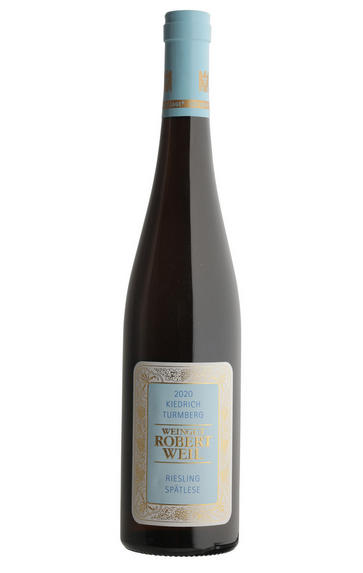
2020 Riesling, Spätlese, Kiedrich Turmberg, Robert Weil, Rheingau, Germany
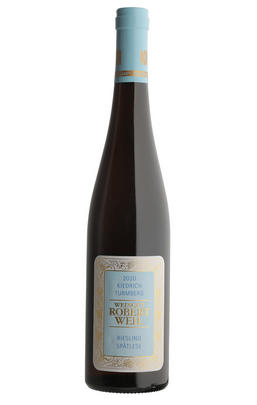
Critics reviews
Clear but intense and complex bouquet of perfectly ripe stone fruit aromas and finely crushed stones. Juicy, piquant and finely tannic on the palate, this is a dense, mouth-filling, juicy Turmberg with profound complexity, structure and length.
Drink 2021-2060
Stephan Reinhardt, Wine Advocate (August 2021)
About this WINE
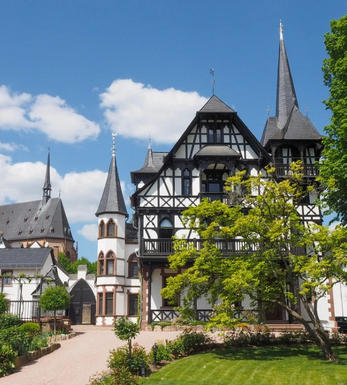
Weingut Robert Weil
Weingut Robert Weil is a renowned and historic winery located in the Rheingau wine region of Germany. Founded in 1875, it has a rich viticultural tradition spanning several generations. The winery is particularly celebrated for its exceptional Riesling wines, which are highly regarded worldwide. Robert Weil's vineyards are primarily situated on steep slopes along the Rhine River, benefiting from the region's unique terroir and favourable microclimate.
The winery's commitment to producing top-quality Rieslings is evident in its meticulous vineyard practices and careful hand-harvesting of grapes. Weingut Robert Weil is known for crafting Rieslings that beautifully balance acidity, fruitiness, and minerality, resulting in wines that age gracefully and are often considered some of the finest examples of German Rieslings. The winery's long-standing dedication to tradition and excellence has earned it a well-deserved reputation as one of Germany's premier Riesling producers.
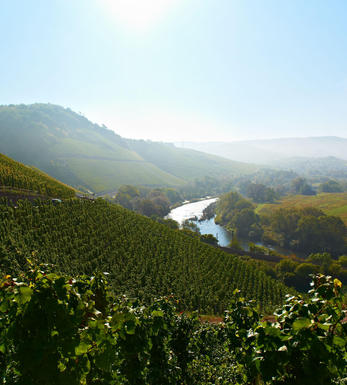
Rheingau
This 3,205 ha Rheingau region extends from Hochheim on the River Main to the evocatively-named Lorch on the River Rhein. The Rheingau’s vineyards are located along one long hillside with the thick forests of the Taunus Hills to the north and the Rhein River to the south. They form a single district known as Bereich Johannisberg. This beautiful region, rich in tradition, evolves as you go east to west, from a fairly flat, dimpled landscape to progressively steeper and more impressive slopes. It is on the latter that the finest wines are made.
The names of many Rheingau vineyards are legendary: Schloss Vollrads, Schloss Johannisberg, Jesuitgarten and Marcobrunn to name but four. Many hint at ecclesiastical origins and indeed, like many other regions of Germany, for centuries these vines were tended by monks. As with the Mosel, the Rhine has a moderating effect on local temperatures, protecting the vines from extreme lows but also, when the temperatures peak in mid-summer, providing a welcome cooling effect. The southern-facing exposure, moisture from the river, clay-dominated soil and the almost Mediterranean-style climate combine to produce dense, rich flavours and – for Germany anyway - full, masculine wines.
The Rheingau is the spiritual home of the Riesling grape; it accounts for almost 80% of plantings and yields elegant wines typically with a lovely, spicy fragrance, rich, ripe fruit and pronounced acidity. Although far less important, some reasonably full-bodied, distinctive red wines with blackberry fruit are made here from Spätburgunder (Pinot Noir). The best examples come from the steep vineyards around Assmannshausen. The region also makes some divine sweet Riesling; indeed Schloss Johannisberg was reputedly the first vineyard in Germany to have harvested nobly rotten grapes for this purpose.
In 1994 the Rheingau was the first German wine region to be given a (semi) official vineyard classification. Drawn up by the Charta organisation and the VDP growers’ association, the best sites were designated as ‘Erstes Gewächs’ (‘First Growths’). The use of this classification is optional but if it is used the wine has to be dry in style or at Auslese level or above. The region is also home to the world-renowned oenological research and teaching institute at Geisenheim which has contributed significantly to the high level of technical competence in the German wine industry today.
Recommended Producers: J. Leitz
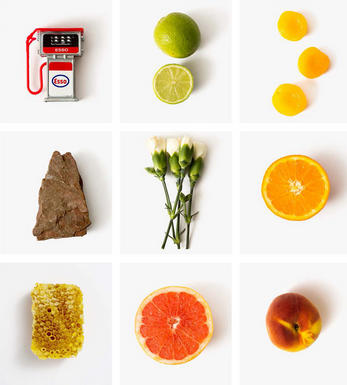
Riesling
Riesling's twin peaks are its intense perfume and its piercing crisp acidity which it manages to retain even at high ripeness levels.
In Germany, Riesling constitutes around 20% of total plantings, yet it is responsible for all its greatest wines. It is planted widely on well-drained, south-facing slate-rich slopes, with the greatest wines coming from the best slopes in the best villages. It produces delicate, racy, nervy and stylish wines that cover a wide spectrum of flavours from steely and bone dry with beautifully scented fruits of apples,apricots, and sometimes peaches, through to the exotically sweet flavours of the great sweet wines.
It is also an important variety in Alsace where it produces slightly earthier, weightier and fuller wines than in Germany. The dry Rieslings can be austere and steely with hints of honey while the Vendages Tardives and Sélection de Grains Nobles are some of the greatest sweet wines in the world.
It is thanks to the New World that Riesling is enjoying a marked renaissance. In Australia the grape has developed a formidable reputation, delivering lime-sherbet fireworks amid the continental climate of Clare Valley an hour's drive north of Adelaide, while Barossa's Eden Valley is cooler still, producing restrained stony lime examples from the elevated granitic landscape; Tasmania is fast becoming their third Riesling mine, combining cool temperatures with high UV levels to deliver stunning prototypes.
New Zealand shares a similar climate, with Riesling and Pinot Gris neck to neck in their bid to be the next big thing after Sauvignon Blanc; perfectly suited is the South Island's Central Otago, with its granitic soils and continental climate, and the pebbly Brightwater area near Nelson. While Australia's Rieslings tend to be full-bodied & dry, the Kiwis are more inclined to be lighter bodied, more ethereal and sometimes off-dry; Alsace plays Mosel if you like.


Buying options
Add to wishlist
Description
Clear but intense and complex bouquet of perfectly ripe stone fruit aromas and finely crushed stones. Juicy, piquant and finely tannic on the palate, this is a dense, mouth-filling, juicy Turmberg with profound complexity, structure and length.
Drink 2021-2060
Stephan Reinhardt, Wine Advocate (August 2021)
wine at a glance
Delivery and quality guarantee